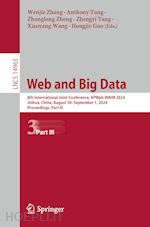
Questo prodotto usufruisce delle SPEDIZIONI GRATIS
selezionando l'opzione Corriere Veloce in fase di ordine.
Pagabile anche con Carta della cultura giovani e del merito, 18App Bonus Cultura e Carta del Docente
The five-volume set LNCS 14961, 14962, 14963, 14964 and 14965 constitutes the refereed proceedings of the 8th International Joint Conference on Web and Big Data, APWeb-WAIM 2024, held in Jinhua, China, during August 30–September 1, 2024.
The 171 full papers presented in these proceedings were carefully reviewed and selected from 558 submissions.
The papers are organized in the following topical sections:
Part I: Natural language processing, Generative AI and LLM, Computer Vision and Recommender System.
Part II: Recommender System, Knowledge Graph and Spatial and Temporal Data.
Part III: Spatial and Temporal Data, Graph Neural Network, Graph Mining and Database System and Query Optimization.
Part IV: Database System and Query Optimization, Federated and Privacy-Preserving Learning, Network, Blockchain and Edge computing, Anomaly Detection and Security
Part V: Anomaly Detection and Security, Information Retrieval, Machine Learning, Demonstration Paper and Industry Paper.
.- Recommender System.
.- Hierarchical Review-based Recommendation with Contrastive Collaboration.
.- Adaptive Augmentation and Neighbor Contrastive Learning for Multi-Behavior Recommendation.
.- Automated Modeling of Influence Diversity with Graph Convolutional Network for Social Recommendation.
.- Contrastive Generator Generative Adversarial Networks for Sequential Recommendation.
.- Distribution-aware Diversification for Personalized Re-ranking in Recommendation.
.- KMIC: A Knowledge-aware Recommendation with Multivariate Intentions Contrastive Learning.
.- Logic Preference Fusion Reasoning on Recommendation.
.- MHGNN: Hybrid Graph Neural Network with Mixers for Multi-interest Session-aware Recommendation.
.- Mixed Augmentation Contrastive Learning for Graph Recommendation System.
.- Noise-Resistant Graph Neural Networks for Session-based Recommendation.
.- S2DNMF: A Self-supervised Deep Nonnegative Matrix Factorization Recommendation Model Incorporating Deep Latent Features of Network Structure.
.- Self-Filtering Residual Attention Network based on Multipair Information Fusion for Session-Based Recommendations.
.- TransRec: Learning Transferable Recommendation from Mixture-of-Modality Feedback.
.- VM-Rec: A Variational Mapping Approach for Cold-start User Recommendation.
.- Knowledge Graph.
.- Matching Tabular Data to Knowledge Graph based on Multi-level Scoring Filters for Table Entity Disambiguation.
.- Complex Knowledge Base Question Answering via Structure and Content Dual-driven Method.
.- EvoREG: Evolutional Modeling with Relation-Entity Dual-Guidance for Temporal Knowledge Graph Reasoning.
.- Federated Knowledge Graph Embedding Unlearning via Diffusion Model.
.- Functional Knowledge Graph Towards Knowledge Application and Data Management for General Users.
.- Hospital Outpatient Guidance System Based On Knowledge Graph.
.- TOP: Taxi Destination Prediction Based on Trajectory Knowledge Graph.
.- Type-based Neighborhood Aggregation for Knowledge Graph Alignment.
.- An Aggregation Procedure Enhanced Mechanism for GCN-based Knowledge Graph Completion Model by Leveraging Condensed Sampling and Attention Optimization.
.- Spatial and Temporal Data.
.- Capturing Fine and Coarse Grained User Preferences with Dual-Transformer for Next POI Recommendation.
.- Enhancing Spatio-Temporal Semantics with Contrastive Learning for Next POI Recommendation.
.- Distinguish the Indistinguishable: Spatial Personalized Transformer for Traffic Flow Forecast.
.- Meeting Pattern Detection from Trajectories in Road Network.
.- Speed Prediction of Multiple Traffic Scenarios with Local Fluctuation.
.- ST-TPFL: Towards Spatio-Temporal Traffic Flow Prediction Based on Topology Protected Federated Learning.
.- A Context-aware Distance Analysis Approach for Time Series.
.- Dual-view Stack State Learning Network for Attribute-based Container Location Assignment.
.- Efficient Coverage Query over Transition Trajectories.











Il sito utilizza cookie ed altri strumenti di tracciamento che raccolgono informazioni dal dispositivo dell’utente. Oltre ai cookie tecnici ed analitici aggregati, strettamente necessari per il funzionamento di questo sito web, previo consenso dell’utente possono essere installati cookie di profilazione e marketing e cookie dei social media. Cliccando su “Accetto tutti i cookie” saranno attivate tutte le categorie di cookie. Per accettare solo deterninate categorie di cookie, cliccare invece su “Impostazioni cookie”. Chiudendo il banner o continuando a navigare saranno installati solo cookie tecnici. Per maggiori dettagli, consultare la Cookie Policy.